8 books about Pack, Robert
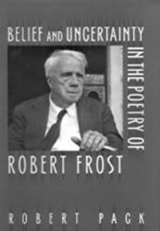
Belief and Uncertainty in the Poetry of Robert Frost
Robert Pack
University Press of New England, 2004
Robert Pack’s lifelong delight in Robert Frost's intricate, beautiful, and profound poetry shines through in the essays in this book. He confronts such broad themes as mourning, inheritance, nature, and the imagination, bringing to bear historical, psychological, Darwinian, and close-textual-reading interpretive approaches. Chapter one sets Frost’s work in the tradition of nature writing, from the Book of Genesis through modern American ecological works. Chapter two examines the profound influences of the Book of Job, Darwin, and evolutionary theory on Frost’s thinking. There follow chapters that structurally and philosophically compare Wordsworth’s “Michael” to Frost’s “Wild Grapes,” focusing on the themes of inheritance, grieving, and the potency of the imagination. The reader encounters Frost as teacher and preacher, Frost’s idea of how beliefs are affirmed, the simultaneous representation of adult memory and immediate childhood sensation, and the underlying duality of place and nothingness, which forms the existential background for his “stay against confusion”—the consoling purpose of Frost's poetic art.
[more]
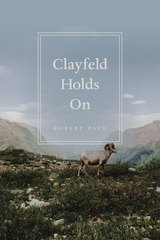
Clayfeld Holds On
Robert Pack
University of Chicago Press, 2015
from “Clayfeld’s Farewell Epistle to Bob Pack”
Beneath this mellow harvest moon,
I can still picture you—a boy content
just fishing with his father from a ledge
above a foaming stream. The flailing trout
you caught is packed in gleaming ice;
the pink stripe all along its side
is smeared across black shiny dots
that seem to shine with their own light.
I’m sure that you can picture me
with equal vividness, and though we’re not
identical, there is a sense
in which I am inventing you
as much as you’re inventing me.
In Clayfeld Holds On, Robert Pack offers his readers a comprehensive portrait of his longtime protagonist Clayfeld, who is also Pack’s doppelgänger, his alternate self, enacting both the life that the poet has lived and the life he might have lived, given his proclivities and appetites. Poet and protagonist, taken together, are self and consciousness of self, the historical self and the embellished story of that literal self.
Written with a masterly ear for rhythm, and interweaving narrative and lyrical passages, the poems recount Clayfeld’s formative memories while exploring concepts such as loyalty, generosity, commitment, as well as cosmic phenomena such as the big bang theory and black holes. Through all of this, Pack attempts to find purpose and meaning in an indifferent universe, and to explore the labyrinth of his own proliferating identity.
Beneath this mellow harvest moon,
I can still picture you—a boy content
just fishing with his father from a ledge
above a foaming stream. The flailing trout
you caught is packed in gleaming ice;
the pink stripe all along its side
is smeared across black shiny dots
that seem to shine with their own light.
I’m sure that you can picture me
with equal vividness, and though we’re not
identical, there is a sense
in which I am inventing you
as much as you’re inventing me.
In Clayfeld Holds On, Robert Pack offers his readers a comprehensive portrait of his longtime protagonist Clayfeld, who is also Pack’s doppelgänger, his alternate self, enacting both the life that the poet has lived and the life he might have lived, given his proclivities and appetites. Poet and protagonist, taken together, are self and consciousness of self, the historical self and the embellished story of that literal self.
Written with a masterly ear for rhythm, and interweaving narrative and lyrical passages, the poems recount Clayfeld’s formative memories while exploring concepts such as loyalty, generosity, commitment, as well as cosmic phenomena such as the big bang theory and black holes. Through all of this, Pack attempts to find purpose and meaning in an indifferent universe, and to explore the labyrinth of his own proliferating identity.
[more]
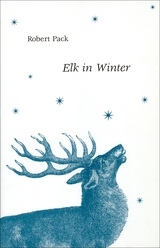
Elk in Winter
Robert Pack
University of Chicago Press, 2004
Robert Pack is a narrative master blessed with a keen ear for everyday speech. In poems that recall Robert Frost's meditative regard of nature, Pack's newest collection, Elk in Winter, resolves universal questions in the particular, the personal, and the intimate. This rich and varied volume moves from comedy to elegy, from lyric to narrative, in which individual characters are revealed and rendered symbolic by the stories that enclose them. What finally unites the poems of Elk in Winter is Pack's desire to appeal to the ear as much as to the heart, and to discover and reveal the passionate music of ideas.
[more]
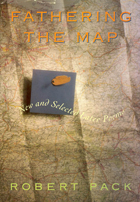
Fathering the Map
New and Selected Later Poems
Robert Pack
University of Chicago Press, 1993
"Poetry," wrote Wordsworth, "is the breath and finer spirit of all knowledge; it is the impassioned expression which is the countenance of all Science." Robert Pack's new book is a heady mixture of the finer spirit.
A selection from his last five books, along with a collection of new poems, Fathering the Map takes us from the personal reflections distilled in the lyrics of Waking to My Name (1980) to the worldly reckonings of Inheritance (1992) and back again. In the dramatic monologues of Faces in a Single Tree (1984), in the narrative of a wayward life from womb to double ending in Clayfield Rejoices, Clayfield Laments (1987), in a cosmic tour conducted by the physicist Heinz Pagels with Before It Vanishes (1990), Pack has fashioned poems of intimate experience, scientific meditations, philosophical wonder, poems that breathe the knowledge of man and woman, young and old, artist and human animal.
Pack's work has won the acclaim of writers, critics, and readers from Robert Penn Warren to Cynthia Ozick to Stephen Jay Gould, who comments that the "precious contacts of science and poetry are now sadly rare, but Bob Pack revitalizes the ancient union with incisive poems that sing with lyricism or bite with insight—but always seem to add wisdom to the scientist's epigram."
"The poet improves his style and spirit as he extends his reach," Howard Nemerov has written, and in his new work Pack reaches back to some of his earliest memories, and so forward to a personal mythology that circles from the primal instant to the present ecological crisis. "Robert Pack's poetry is deeply rooted in his won family life," Richard Wilbur has remarked, "and yet his imagination has always included us all."
And Cynthia Ozick has said of Pack's poetry: "We rejoice as we read."
A selection from his last five books, along with a collection of new poems, Fathering the Map takes us from the personal reflections distilled in the lyrics of Waking to My Name (1980) to the worldly reckonings of Inheritance (1992) and back again. In the dramatic monologues of Faces in a Single Tree (1984), in the narrative of a wayward life from womb to double ending in Clayfield Rejoices, Clayfield Laments (1987), in a cosmic tour conducted by the physicist Heinz Pagels with Before It Vanishes (1990), Pack has fashioned poems of intimate experience, scientific meditations, philosophical wonder, poems that breathe the knowledge of man and woman, young and old, artist and human animal.
Pack's work has won the acclaim of writers, critics, and readers from Robert Penn Warren to Cynthia Ozick to Stephen Jay Gould, who comments that the "precious contacts of science and poetry are now sadly rare, but Bob Pack revitalizes the ancient union with incisive poems that sing with lyricism or bite with insight—but always seem to add wisdom to the scientist's epigram."
"The poet improves his style and spirit as he extends his reach," Howard Nemerov has written, and in his new work Pack reaches back to some of his earliest memories, and so forward to a personal mythology that circles from the primal instant to the present ecological crisis. "Robert Pack's poetry is deeply rooted in his won family life," Richard Wilbur has remarked, "and yet his imagination has always included us all."
And Cynthia Ozick has said of Pack's poetry: "We rejoice as we read."
[more]
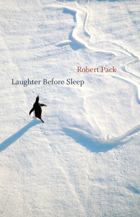
Laughter Before Sleep
Robert Pack
University of Chicago Press, 2011
One of America’s most eminent nature poets, Robert Pack has won the acclaim of writers, critics, and readers from Stephen Jay Gould to Mark Strand. In his latest collection, Laughter Before Sleep, Pack carries on his themes of family and friends, responsibility to the natural world of evolved diversity, the transience of life, the fragility of happiness, and the consolations offered by art and music.
Laughter Before Sleep weighs the nature of endings from the perspective of old age and embraces the humor and play of memory that keep mortality at bay.As we are carried along with Pack’s lyrical, sensitive, and intelligent verse, he takes us on a moving but often comic journey toward the end of life. In the opening section, Pack composes poems that meditate upon a sense of his own diminishing and the meaning of absences. The middle sections form episodes of a memoir in verse, moving from family to history and back again, reflecting on the power of anecdote to shape a life in retrospect. With the final section, Pack recalls his unfulfilled plan to raise penguins in Montana, offers a panegyric on Darwin’s nose, and makes the mistake of trying to impress a police officer with a book of poems.
Filled with charm and wit but also with philosophical melancholy, Laughter Before Sleep is a superb addition to the poet’s oeuvre.
[more]

Minding the Sun
Robert Pack
University of Chicago Press, 1996
With characteristic sensitivity and intelligence, Robert Pack reflects on man's relation to and responsibilities toward nature. Throughout, his verses are informed with an ecological vigilance born of his devotion to the New England landscape.
The opening section marks a return for Pack to the musical sensuality of the lyric. These short lyrics are uniquely his: the sequence begins in Vermont and concludes in the Andromeda galaxy, providing an opportunity to hold in mind the nurturing sun of our solar system.
The poems of the collection's middle section, written in the flowing narrative and meditative mode familiar to Pack's many admirers, take up the themes of human sexuality and consciousness. And the final section, replete with puns and paradoxes, shows Pack at his most playful as he muses on art, technology, romantic and marital desire, and the stubborn longing for transcendence. The poet concludes the volume with a sobering plea, "The Trees Will Die," to heed the sun's example, to cherish and protect our planet and all its living things.
The opening section marks a return for Pack to the musical sensuality of the lyric. These short lyrics are uniquely his: the sequence begins in Vermont and concludes in the Andromeda galaxy, providing an opportunity to hold in mind the nurturing sun of our solar system.
The poems of the collection's middle section, written in the flowing narrative and meditative mode familiar to Pack's many admirers, take up the themes of human sexuality and consciousness. And the final section, replete with puns and paradoxes, shows Pack at his most playful as he muses on art, technology, romantic and marital desire, and the stubborn longing for transcendence. The poet concludes the volume with a sobering plea, "The Trees Will Die," to heed the sun's example, to cherish and protect our planet and all its living things.
[more]
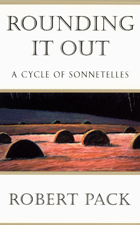
Rounding It Out
A Cycle of Sonnetelles
Robert Pack
University of Chicago Press, 1999
Acclaimed by writers, critics, and readers from Robert Penn Warren to Stephen Jay Gould, Robert Pack is one of the most widely respected poets in America. Pack's newest collection, Rounding It Out, offers a lyric sequence exploring circularity as a musical principle and as a paradigm of the human experience. The imagistic content of the poems, as well as their structure in four sections—morning, midday, evening, night—recall nature's primary rhythm of departure and return, and the dust-to-dust cycle of a completed lifetime.
Rounding It Out is not only about these themes, but also, through reflection, about its own chosen form. Each of the poems is a cross between a sonnet and a villanelle, a formal innovation Pack calls a sonnetelle. Employing meter and rhyme, assonance and alliteration, Pack takes delight and finds consolation in the sensuousness of the English language even in the face of mortality and ongoing personal loss.
Rounding It Out is not only about these themes, but also, through reflection, about its own chosen form. Each of the poems is a cross between a sonnet and a villanelle, a formal innovation Pack calls a sonnetelle. Employing meter and rhyme, assonance and alliteration, Pack takes delight and finds consolation in the sensuousness of the English language even in the face of mortality and ongoing personal loss.
[more]
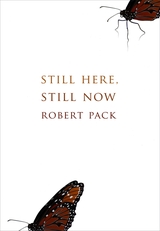
Still Here, Still Now
Robert Pack
University of Chicago Press, 2008
Robert Pack is one of America’s most eminent nature poets, and his virtuoso talents are on glorious display in Still Here, Still Now, his nineteenth volume of verse. With styles ranging from lyric to narrative, and themes stretching from biblical concerns to meditations on contemporary science, Pack’s poetry is composed in strongly rhythmic cadences and a diction that is direct and accessible. In four different sections of thematically and stylistically divergent verse, Still Here, Still Now delivers many of the elements of Pack’s poetry readers have come to admire and expect—both the humorous and the elegiac.
The first section of the book contains traditional lyrics that celebrate family ties and seek consolations for the passing of personal and evolutionary time. The poems in this group address a named or unnamed auditor in a voice of intimate engagement. Featuring the most narrative selections in the book, the second section consists of fable-like stories, rich with innuendo and implication. The characters in these poems make choices that press against the events and circumstances that challenge and define them. Embodying what Harold Bloom has called Pack’s “courage to surmount suffering,” the poems of the third section are largely devoted to biblical themes and philosophical speculations on the meaning of happiness and the uses of suffering. Here, Pack’s empathy for the human condition as well as his forebodings about the prospect of human survival are on poignant display. The final section of the book turns to Pack's abiding interest in landscape and the ways in which the place one inhabits contains and animates our individual lives.
Ripe with many years, Pack remains a vital presence in American letters. Still Here, Still Now is an affecting and graceful addition to the oeuvre of a poet whose compelling and distinct voice will continue to resonate among his loyal readers.
The first section of the book contains traditional lyrics that celebrate family ties and seek consolations for the passing of personal and evolutionary time. The poems in this group address a named or unnamed auditor in a voice of intimate engagement. Featuring the most narrative selections in the book, the second section consists of fable-like stories, rich with innuendo and implication. The characters in these poems make choices that press against the events and circumstances that challenge and define them. Embodying what Harold Bloom has called Pack’s “courage to surmount suffering,” the poems of the third section are largely devoted to biblical themes and philosophical speculations on the meaning of happiness and the uses of suffering. Here, Pack’s empathy for the human condition as well as his forebodings about the prospect of human survival are on poignant display. The final section of the book turns to Pack's abiding interest in landscape and the ways in which the place one inhabits contains and animates our individual lives.
Ripe with many years, Pack remains a vital presence in American letters. Still Here, Still Now is an affecting and graceful addition to the oeuvre of a poet whose compelling and distinct voice will continue to resonate among his loyal readers.
[more]
READERS
Browse our collection.
PUBLISHERS
See BiblioVault's publisher services.
STUDENT SERVICES
Files for college accessibility offices.
UChicago Accessibility Resources
home | accessibility | search | about | contact us
BiblioVault ® 2001 - 2024
The University of Chicago Press









